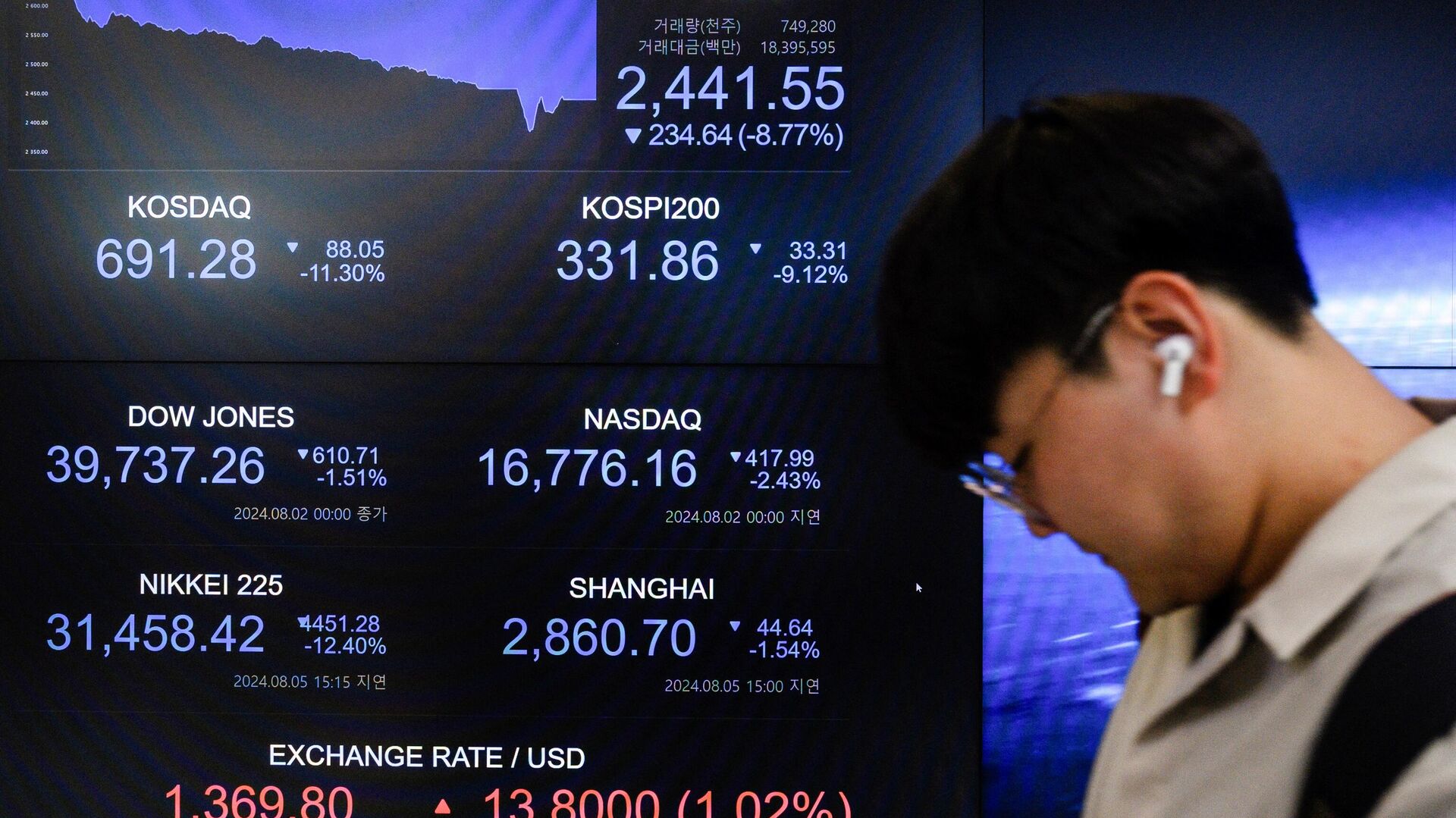Why Did the Global Stock Market Crash And Who is to Blame?

© AFP 2023 / ANTHONY WALLACE
Subscribe
Japan’s benchmark Nikkei 225 stock index plunged 12.4% on Monday, with an ensuing chain of sell-offs that shook the world markets as investors anguished over the state of the US economy and fears of a recession.
The combination of "political mismanagement of debt, politicized fact-spinning, and resulting inflation" - all very real risks - have been factors contributing to serious market volatility, as the recent global market plummet has shown, Paul Goncharoff, a veteran financial analyst, told Sputnik.
“First, neither the US, EU or Japanese economies are doing well. The US manufacturing sector contracted for the fourth consecutive month in July, with the Manufacturing PMI registering 46.8 percent, signaling a technical recession. Japan’s PMI also dipped to 49.1 percent, signaling manufacturing decline. In broad terms, it shows that the G7 countries are all struggling in terms of their economies,” he said.
In this specific case, the knee-jerk global market response is being blamed on the employment report from the US showing sharply increased unemployment, noted the co-owner of the Russia's Pivot to Asia project.
Global stock markets found themselves gripped by a rout on Monday triggered by grim jobs data emerging from the US Labor Department. The most aggressive selloff was in Asia, where the Tokyo Stock Exchange index nosedived over 13% on disconcerting data fanning fears of a US recession. Japan's benchmark Nikkei 225 dropped 18.2% in two days, including the 12.4% Monday plunge - the worst single-day decline since the Black Monday stock market crash of 1987.
Asia stock markets plunge as grim jobs data fans fears of US recession
— Sputnik (@SputnikInt) August 5, 2024
The Tokyo Stock Exchange index nose-dived over 13% on Monday amid disconcerting data on rising US unemployment. The decline is the sharpest since the Black Monday stock market crash of 1987.
Japan's… pic.twitter.com/0FQ2PdJn75
The broader TOPIX index fell 11.5%. The bear market also saw South Korea's benchmark KOSPI index (.KS11) plummet as much as 10.8%, ending the session down 8.8% at 2,441.55. This was its biggest percentage drop since the global financial crisis of 2008.
MSCI Asia Pacific ex-Japan Index (.MIAPJ0000PUS), fell more than 2%, and Taiwan’s Taiex dropped 8,4% in its worst sell-off since 1967.
US stock futures fell more than 2% in Asian trading amid the market convulsions. Nasdaq Futures were down 5% to 17,623.50 points, after plummeting over 6% earlier. S&P 500 Futures and Dow Futures fell 2.6% and 1.12%, respectively. Tech stocks Nvidia, Apple and Tesla dropped over 5% in pre-market trading.
In Europe, benchmark indexes were down more than 2%. Germany's DAX was down 2.5% at 17,222.69. The CAC 40 in Paris lost 2.4%, falling to 7,080.96, and the FTSE 100 in London was 2% lower at 8,011.52.
As Asian stocks were down across the board, cryptocurrencies started tumbling too. Over $1,000,000,000 were shed by the cryptocurrency market in the past 24 hours. Bitcoin is currently trading at around $52,500.
Wall Street’s Volatility Index (VIX), used by investors to measure the level of risk in the market, is up 48% to 34, after surging to 41.8 earlier – a level last seen in June 2020.
The losses came in the wake of a much weaker-than-anticipated US jobs report for July. Hiring fell, with the unemployment rate surging for the fourth straight month to reach 4.3%, the Labor Department reported Friday. The data fueled fears that the economy could be falling into a recession amid high interest rates intended to curb inflation. Goldman Sachs analysts have lifted the US recession risks in the coming year to 25% from 15%. Meanwhile, JPMorgan predicts a 50% slowdown for the US economy.
US a 'Debt Economy'
Weighing in on the dramatic selloff sparked on Monday, Paul Goncharoff pointed out that “the world's financial and economic flows are based on debt.” And the American economy has long “morphed” into a debt economy, with close to $1 trillion in new debt being taken on every 3–4 months.
“How do you attract new buyers of US debt? By increasing yields earned, which leads to all the problems earlier touched on, and more,” Goncharoff explained.
“Government bonds are assumed to be safe because governments can always tax their citizens in order to pay their creditors, but if the value of these government bonds suddenly experiences volatility because of politicized fiscal policy or extreme geopolitical positions, then those who borrowed against these bonds risk being liquidated. In other words, they are forced to sell, and this can start a chain reaction of forced selling across the board,” he noted.
On the other side of the coin, there is inflation, noted the finance expert.
Too much inflation can prompt the holders of government bonds to request a yield to compensate for the fact that when the bond is finally paid back, the money won't be worth what it was originally, clarified. If one takes a look at the politics of central banks, it seems like “the EU wishes to ease rates, the US sits on the fence and keeps rates the same, and the canary in the coal mine, Japan, needs to push rates up.”
All of this churns out the sort of uncertainty that translates into market volatility, such as currently witnessed.
While fears that the US economy is heading for recession have been looming for quite some time, developments in the Middle East could further feed into the “crowded geoeconomic and geopolitical cauldron,” stressed the pundit.
“Any additional ingredient to this witches brew could force it to boil over. The Middle East is certainly no exception, plus we are witnessing a massive loss of trust among the international community as to the true intentions and goals of the US government, which just increases volatility and uncertainty,” he summed up.



